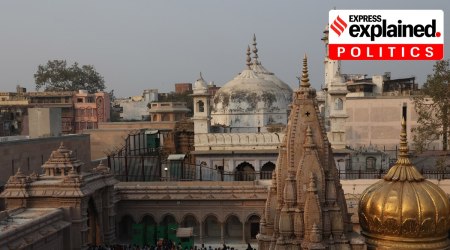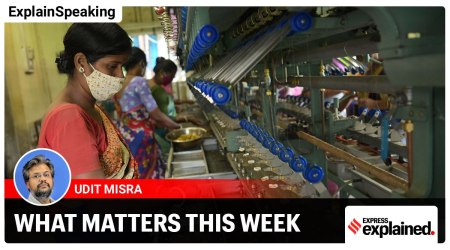[ad_1]
Madrasa education has been criticised for many years. Assam Chief Minister Himanta Biswa Sarma recently said the word “madrasa” should cease to exist and that “modern education” should be imparted from madrasas. He also said students would not attend madrasas if they were told madrasa students would not be able to become doctors or engineers.
However, students who have spent their initial or developing years in madrasas disagree with the claim. Indianexpress.com talked to a few students who have attended madrasas at some point in their lives and are well-settled in their chosen careers.
Why do students opt for madrasa?
A lot of children from the Muslim community opt to study at a madrasa in their initial years. Fazal Ilahi, a software developer, pointed to the financial factors. “Madrasas offer free education and I believe that is one major reason why children of financially backward families opt to study at madrasas,” he said.
Arif*, a 30-year-old man who attended a madrasa for 11 years, said families also send their children to madrasa to ensure they do not miss out on religious education. “I used to learn about the Quran and how to offer namāz and stuff like that in madrasa. The main objective behind this is to ensure that we know what is our religion, community and culture. I was never told that I was not an Indian, but I was told that I should make sure I do not forget the principles of my culture. The same is the scenario with my friends; some of them attended because they came from poorer backgrounds, but others were there to learn about our culture,” he explained.
What about doctors and engineers?
Many believe madrasas teach children only about Islam and that madrasa education does not help students build a successful and stable career.
“The term madrasa in Arabic means ‘a school, where you go to study’,” explained Khalid MM, who works as a senior linguist at Lionbridge Technologies in Bengaluru. “So children who go to a madrasa go there to study and it is not just about the religion but other basic concepts too.”
Citing an example, Mohamed Abdullah, a former student of Jamia Khairathul Islam Arabic College in Tamil Nadu, said he had attended the madrasa full-time after Class 12. “During my time at Jamia Khairathul Islam Arabic College, I was studying for a B Com and then an M Com degree. My time at the madrasa did not affect my university degrees. In fact, every Sunday a professor used to come to teach us the syllabus related to university degrees.” Abdullah is a project coordinator in a software company.
Ilahi said the full-time madrasas conduct religious studies in the morning and then after a gap they teach secular subjects in the evening. “These include mathematics, English, a local language and two more subjects. For full-time madrasa students, it is also compulsory to appear for Class 10 board exams. After that, whether or not to continue their studies and get enrolled for higher studies is up to the students,” he said.
He dismissed as a myth the notion that madrasas teach only religious subjects. “They know how the world works now, and they do realise we cannot survive in this world without earning and that everyone needs money. So they teach us secular subjects too to ensure that we can earn our living,” he said.
Asked why not all madrasa students chose mainstream careers options, Mohamed Abdullah, another former madrasa student, said, “Some students may not have the capacity to learn the secular subjects being offered. Some of them may, however, be able to grasp Arabic quicker. Such students end up becoming translators and interpreters and even work with clients from Dubai, Saudi Arabic etc. So they have not failed but simply chosen a career which may not be just as mainstream as that of a doctor or engineer.”
Shahid T Komath, a civil servant, also spent a major chunk of his academic life in a madrasa. He joined a madrasa after completing Class 5 and continued studying there for the next 12 years. While the madrasas at that time were not very “modern”, he is now happy to see that a lot of madrasas are now providing “modern education”. He decided to prove that someone from a madrasa can also be in a mainstream profession. “Therefore I decided to get into government jobs and started studying for the UPSC exam,” he said. He said his madrasa had encouraged him to prepare for entrance exams in his free time.
‘Come, study with us’
The Uttar Pradesh government recently announced that no new madrasa would be given a grant. However, students who have spent years at madrasas are now inviting people from other communities and especially the people in higher positions to come and take a glimpse of what happens in a madrasa every day. “I don’t think anyone would mind if someone from some other community comes to a madrasa to study with us. We welcome them,” Shahid said.
“To be honest, if anyone wants to learn Arabic, I think coming to a madrasa to learn the basics would be the best choice. I don’t think anyone in my madrasa would object to it. Especially in south India, nobody would,” said Arif*.
*Name changed on request
!function(f,b,e,v,n,t,s)
{if(f.fbq)return;n=f.fbq=function(){n.callMethod?
n.callMethod.apply(n,arguments):n.queue.push(arguments)};
if(!f._fbq)f._fbq=n;n.push=n;n.loaded=!0;n.version=’2.0′;
n.queue=[];t=b.createElement(e);t.async=!0;
t.src=v;s=b.getElementsByTagName(e)[0];
s.parentNode.insertBefore(t,s)}(window, document,’script’,
‘https://connect.facebook.net/en_US/fbevents.js’);
fbq(‘init’, ‘444470064056909’);
fbq(‘track’, ‘PageView’);
[ad_2]
Source link





